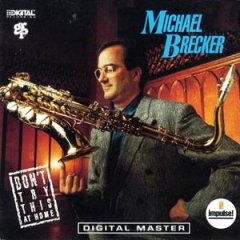Michael Brecker - Don't Try This at Home (1988)
Michael Brecker - Don't Try This at Home (1988)

1. Itsbynne Reel
2. Chime This
3. Scriabin
4. Suspone play
5. Don't Try This At Home
6. Everything Happens When You're Gone
7. Talking To Myself
8. The Gentleman & Hizcaine play
Personnel:
Jeff Andrews - Bass, Bass (Electric)
Jim Beard - Synthesizer, Piano
Michael Brecker - Keyboards, Sax (Tenor), EWI
Joey Calderazzo - Piano
Jack DeJohnette - Drums
Peter Erskine - Drums
Tommy Gill - Piano Technician
Don Grolnick - Piano, Producer
Charlie Haden - Bass, Bass (Acoustic)
Herbie Hancock - Piano
Judd Miller - Synthesizer
Adam Nussbaum - Drums
Mark O'Connor - Violin
Mike Stern – Guitar
Michael Brecker’s incredibly assured debut as a leader is a hard act to follow, but Don’t Try This at Home (issued on the Impulse label) is a worthy followup. As before, Brecker achieves an artful balance of complex songforms/orchestrations and fiery soloing. This date definitely stands up to repeated listening. Although the EWI (Electronic Wind Instrument) is not the equal of a saxophone in terms of expressiveness, Brecker continues to find appropriate uses for it on Don’t Try This at Home.
On Itsbynne Reel, it’s surprising how well the EWI lends itself to the Irish flavor of the tune. Using Irish music an an ingredient in fusion is a fresh approach and works beautifully here. Similarly, Michael Brecker’s EWI finds a suitable expression in the warped melody of the “I Got Rhythm” based changes of Mike Stern’s composition Suspone. Brecker wisely plays tenor for his solo.
Don’t Try This At Home is Brecker’s EWI feature, the equivalent of Original Rays on Brecker’s debut date. Again, it starts out with a duet between Jack DeJohnette’s drums and the EWI, but this time, a droning synthesizer countermelody programmed by Judd Miller insinuates itself. In the next section, we get an enigmatic melody over a Escher staircase of chords with an unusual traveling bass line. It’s rather abstract but still very accessible. It’s definitely one of the high points of Don’t Try This at Home, but hardly the only one.
Part of the general high quality of Don’t Try This at Home is due to the compositions. As a composer, it must have been tough to be Randy Brecker’s brother, but Michael had nothing to be ashamed of — he was an excellent composer in his own right. But look who else contributes tunes: Don Grolnick, Mike Stern, and Jim Beard, accomplished tunesmiths all.
Chime This, a Don Grolnick composition, is hard to describe, but it’s got several memorable melodies and a structure that is anything but obvious, but in no way obscure.
Everything Happens When You’re Gone is a ballad, but lacks the saccharine sentimentality that is Brecker’s worst enemy. Michael Brecker the composer is often Michael Brecker the saxophonist’s best friend, and that is definitely the case here. Everything Happens When You’re Gone has a long-limbed structure that gradually builds to some earned emotion, for a change. It’s a great ballad and one of Brecker’s best tunes.
Jim Beard’s playful The Gentleman & Hizcaine is another tune with an Irish flavor. With arpeggios and a staggered rhythm, it captures the old man’s progress as he makes his way unsteadily up a cobblestone path. The tune makes it clear that while the old man’s body may have become rickety, his mind remains razor sharp.
Indeed, when the weakest tune on a recording is Vince Mendoza’s ballad Scriabin, you’ve got a heck of a strong set of compositions, stronger actually than Brecker’s debut. I’d say that the writing on Don’t Try This at Home represents a pinnacle in modern jazz composition.
The musicianship is up to the demands of the tunes, too. On drums, besides DeJohnette, we’ve got Adam Nussbaum and Peter Erskine; on bass, Charlie Haden or Jeff Andrews; on guitar, Mike Stern; on keys, Don Grolnick, Herbie Hancock, Jim Beard, and Joey Calderazzo. You might think that Joey Calderazzo might be the weak link, but no, he holds his own with these giants.
Really, it’s hard to think of anything bad to say about Don’t Try This at Home. It’s greatness doesn’t reach out and grab you by the throat, but it’s rich and deep. There’s a lot here. You can listen to Don’t Try This at Home at many different levels, from background music all the way to transcribing the music — it’s rewarding any way you slice it. -- Scott Yanow
Zmieniony (Czwartek, 03 Styczeń 2013 15:13)








